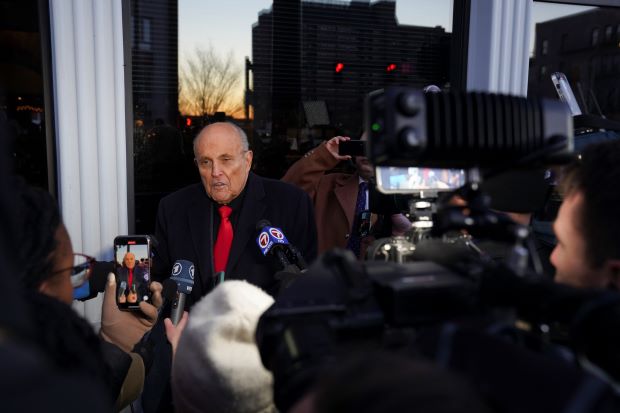Giuliani and other Trump allies arraigned in Arizona election case

By Danny Hakim and Jack Healy
PHOENIX — The arraignments of Rudy Giuliani and 10 other allies of Donald Trump were underway Tuesday (21) morning in an Arizona criminal case that charges them with trying to keep Trump in power after he lost the 2020 presidential election.
A total of 50 people — including Trump, who has locked up the Republican nomination in the 2024 presidential race — now face charges related to election interference in four states. A number of Trump allies have already pleaded guilty or reached cooperation agreements in cases in Georgia and Michigan.
Giuliani, who was served a notice of his indictment Friday (17), was expected to appear at his arraignment virtually, while most of the other defendants appeared in person Tuesday at a courthouse in Phoenix. The other defendants include Christina Bobb, a Trump campaign adviser in 2020 who is now the election integrity counsel for the Republican National Committee, and Kelli Ward, a former head of the Arizona Republican Party.
Ward was the first to be arraigned Tuesday, followed by several others who served as fake electors for Trump in the state in 2020, and by Bobb. All of them pleaded not guilty.
All of the defendants in the Arizona case are charged with conspiracy, fraud and forgery. Others will be arraigned next month, including Boris Epshteyn, who is one of Trump’s main lawyers, and Mark Meadows, a former White House chief of staff.
The first to be arraigned in the case was John Eastman, a lawyer who helped hatch a plan to deploy fake electors for Trump in swing states that he lost; Eastman was arraigned in Phoenix last week and pleaded not guilty.
Trump has not been charged in the Arizona case. He is listed as ‘Unindicted Co-conspirator 1’ in the indictment.
Giuliani was the last of the Arizona defendants to be served a notice of his indictment, a necessary step before arraignment. The office of Kris Mayes, the Arizona attorney general, said Giuliani evaded efforts to serve him for several days. On Friday, Giuliani, a former mayor of New York City, posted on the social platform X a photo of himself, captioned: “If Arizona authorities can’t find me by tomorrow morning: 1. They must dismiss the indictment; 2. They must concede they can’t count votes.” The photo has since been deleted.
He was served his notice that evening, after leaving a party for his 80th birthday.
“The final defendant was served moments ago,” Mayes, a Democrat, wrote in a social media post-Friday night. “@RudyGiuliani nobody is above the law.”
Over the weekend, Giuliani wrote on Facebook that he had “no idea Arizona was looking for me” until “somebody told me there was a news article saying they were having a hard time finding me.”
Writing that he had “accepted service like a gentleman with dignity,” he added: “I’ve done nothing wrong.”
Thomas F. Jacobs, a lawyer for Bobb, said the case had numerous flaws and would not succeed against any of the defendants. “You have to prove it to a Maricopa County jury, which will have members of both parties,” he said, adding, “I can’t logically see it as anything other than a political move.”
Mayes secured indictments of all 11 people who served as fake Trump electors in Arizona, as well as seven Trump advisers. Trump and several of the same advisers were among those who have been charged in a similar case in Fulton County, Georgia. The attorneys general of Michigan and Nevada have brought charges focusing solely on the people who signed up to be fake electors in those states.
None of the cases are seen as likely to go to trial before November, assuring that the legal battle over Trump’s efforts to overturn the results of the 2020 election will still be going on after the 2024 election.
Giuliani was directly involved in efforts to reverse Trump’s loss at the polls in Arizona. Rusty Bowers, a former Arizona House speaker, has testified that Giuliani and Trump pressured him to get the state Legislature to review the Arizona vote.
Bowers testified that Giuliani made numerous claims of ballot fraud during a phone call on Nov. 22, 2020, and promised to provide evidence of the supposed fraud, but never did. “Aren’t we all Republicans here?” Bowers recalled Giuliani saying. “I would think we would get a better reception.”
In a meeting on Dec. 1, 2020, according to Bowers’ testimony, Giuliani was searching for ways to decertify the Arizona election results. Bowers said Giuliani told him in the meeting, “We don’t have the evidence, but we have lots of theories.”
“We all looked at each other and said: Did he really say that?” Bowers told members of Congress.
Bowers ultimately rebuffed the efforts to interfere with Arizona’s election results.
Ward’s involvement started “almost immediately after the election,” according to the indictment when she sent messages to Republicans on the Maricopa County Board of Supervisors and urged them to delay certifying the results. She and her husband, Michael, who also faces charges, both acted as fake electors.
So far, the defendants in the various cases have generally not challenged evidence showing the steps taken by Trump and his allies to cling to power despite his defeat. Instead, they have claimed that their actions were protected by the First Amendment or by immunity, or they have argued that they were merely planning for the possibility that the Trump campaign would prevail in legal challenges to Biden’s victory.
Brad Miller, a lawyer for Ward and her husband, said after their arraignments that they had done nothing illegal by acting as pro-Trump electors.
“What they’re attempting to do is exercise their constitutional right for peaceable protest, their constitutional right for redress of grievances of their own government,” Miller said outside the courthouse. “That should be celebrated. It shouldn’t be criminalized.”
-New York Times


Comments are closed, but trackbacks and pingbacks are open.